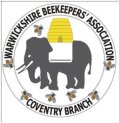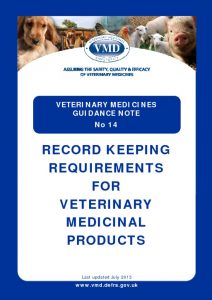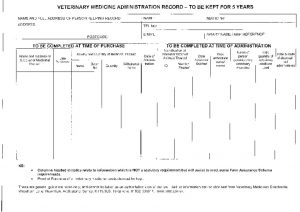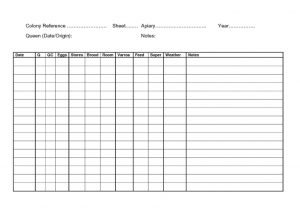The Veterinary Medicine Directorate(VMD) and the EU define Honey Bees as ‘Food Producing Animals’.
Guidance note #14, from the VMD can be accessed from the link below this text. You should read the section about Record Keeping for Food Producing Animals.
The critical aspect of this is to stop honey becoming contaminated and if it does become contaminated it should be possible to trace back to the source of that contamination via the appropriate record of administration (in our case kept by the beekeeper! – see example below).
The VMD work with Environmental Health and Trading Standards to get samples of honey from Beekeepers, off the shelves at retail outlets and from honey processors and analyse those samples for any items which should not be in there.
The VMD’s view is that the only products that should be put into a hive of bees are those from the approved list of medicines. This will ensure the honey is not contaminated. And records should be kept (for 5 years) of what products have been put into the hives and where they were bought.
With that in mind you may need to change what you do:
Icing sugar, thymol crystals, all the products marketed as hive cleans or to manage Varroa, Vaseline spread onto the runners, formic acid, essential oils, etc are NOT approved as products to be put into hives with bees and we are expected NOT to be using them.
To be safe, in case your honey is sampled, stick to the VMD approved list – Apistan, Apiguard, Thyomvar, Apilifevar, MAQs and Api-Bioxal (imported via a vet)
To sterilise your hives (when no bees are in them) of AFB spores and EFB bacteria, use a blow torch or bleach solution at the recommended strength.
Fumigation of frames/comb with Acetic acid is still OK (as I understand it) as long as the withdrawal period is adhered to.
One thing to bear in mind is that after the various scandals about food contamination, horsemeat etc, the world is changing to provide better protection to the end consumer.
Example Record provided by Bill Crofts
This is an example of a record of the acquisition, use and disposal of Api-Bioxal (Oxalic Acid) in 2013. It may help you if you are not sure about keeping your own records.
NOTE: This record should be kept with a copy of the Vet’s Certificate, issued when it the Oxalic Acid was purchased. In our case, if you purchased via Dave Bonner, he would have sent you a copy of the Vet’s certificate relevant to your purchase at the time.
These records should be kept for 5 years.
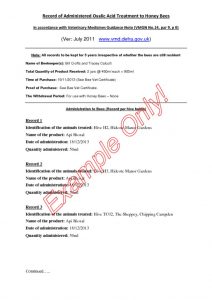
It is a legal requirement to keep a record of all treatments and medicines given to bees and that record to be kept for 5 years.
